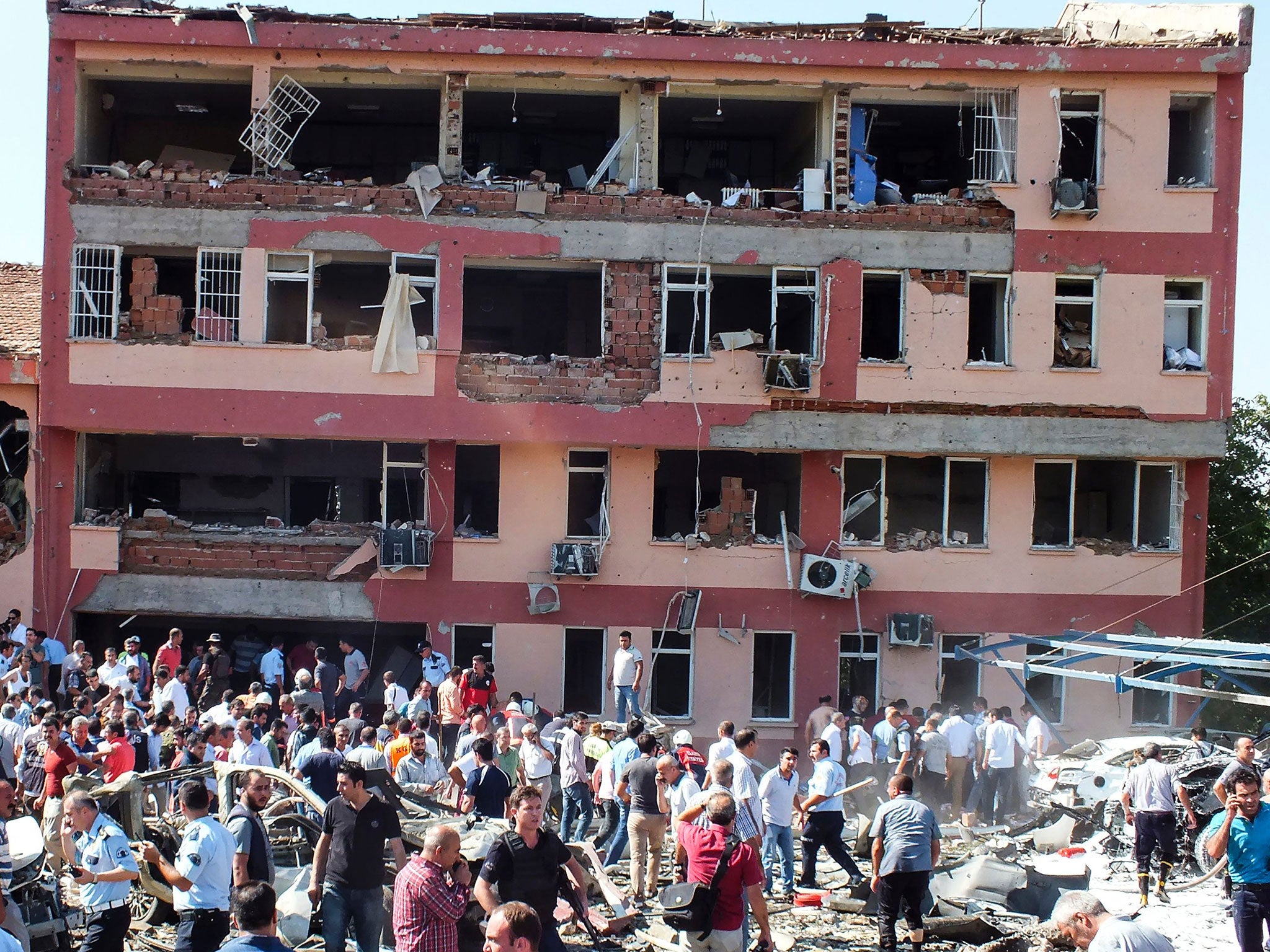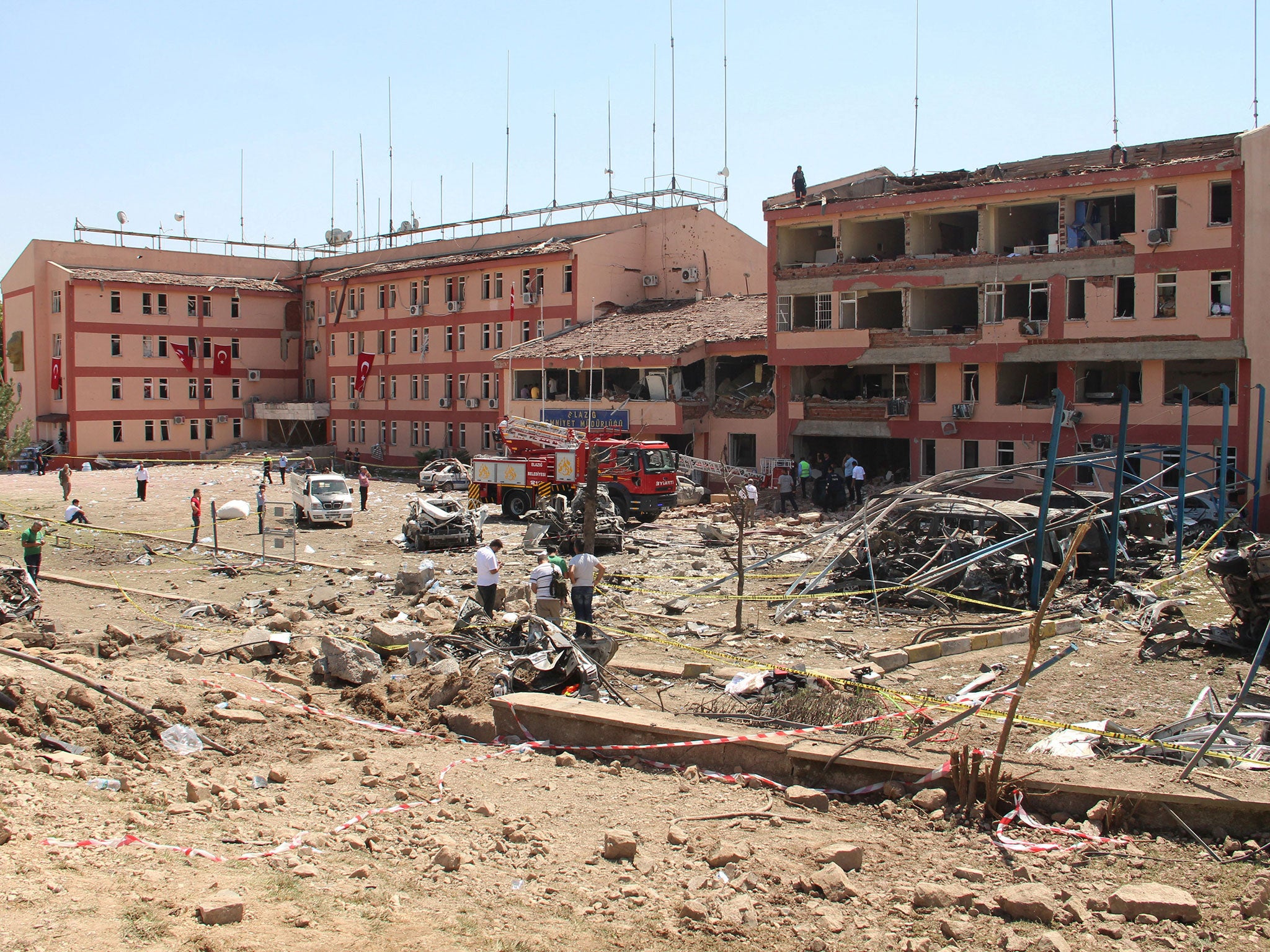Turkey explosion: At least 11 killed and more than 200 injured in string of deadly bombings sparking media blackout
Separatist Kurdish groups were suspected of being behind the blasts
Your support helps us to tell the story
Our mission is to deliver unbiased, fact-based reporting that holds power to account and exposes the truth.
Whether $5 or $50, every contribution counts.
Support us to deliver journalism without an agenda.

Louise Thomas
Editor
At least 11 people have been killed and more than 200 injured in a string of bombings blamed on separatist militants in Turkey.
One blast struck near a police station in the city of Elazig on Thursday morning, hours after another car bomb was detonated near the Iranian border.
A third attack saw a roadside bomb targed a military vehicle as it carried soldiers through the south-east of the country.

Local suspicion quickly turned to Kurdish separatist groups but there was no immediate claim of responsibility for the attacks.
Footage showed dozens of people running from the explosion in Elazig, which partly destroyed several buildings and left the street strewn with rubble and overturned cars.
Inside the police station, officers searched for their colleagues through offices filled with debris, after windows were shattered and walls and ceilings blown down by the force of the blast.
A large plume of smoke was seen rising from the area of the blast as emergency services gathered at the scene at 9.20am local time (7.20am BST).
Murat Zorluoglu, the governor for Elazig, said the explosion killed three police officers and wounded 146 people, with 14 in a serious condition.
Kurdish militants have carried out frequent bomb attacks in south-eastern parts of Turkey in recent months but Elazig, in Eastern Anatolia, has not been an area of significant conflict.

Hours later in the south-eastern province of Bitlis, four soldiers were killed and seven wounded after rebels detonated an improvised explosive device as an armoured military vehicle was passing by.
On Wednesday night, three people were killed and 73 more - 53 civilians and 20 police officers - had been wounded when a car bomb exploded near another police station in the eastern province of Van near the Iranian border.
The Defence Minister, Fikri Isik, said the Kurdistan Workers' Party (PKK) was behind the attacks. “The people see the real face of the PKK,” he said.
Amnesty International condemned the bombings as “the latest in a series of reckless and brutal attacks”.
"Those responsible for these crimes show a contempt for the right to life and must be brought to justice," said Andrew Gardner, the rights group's Turkey researcher.
Authorities imposed a temporary blackout on media coverage of the bombing in Elazig, citing “public order and national security” concerns in a move frequently seen after deadly attacks.

Thursday's order asked media organisations to refrain from broadcasting and publishing anything that may cause “fear in the public, panic and disorder and which may serve the aims of terrorist organisations”.
Clashes between fighters and the Turkish military resumed last year after a fragile peace process collapsed.
More than 600 Turkish security personnel and thousands of PKK militants have been killed, according to the state-run Anadolu Agency, while human rights groups say hundreds of civilians have also been killed.
Tens of thousands of people since the PKK, with is proscribed as a terrorist group by the British Government and others, took up arms demanding autonomy in Turkey in 1984.
The latest attacks came amid continuing international alarm over the government’s response to a failed coup to oust President Recep Tayyip Erdogan.
Prime Minister Binali Yildirim said more than 40,000 people had been detained since the attempt on 15 July and about half have been formally arrested pending charges.
Those arrested include journalists and academics accused of supporting the Gulen movement, which authorities blame for the coup, and thousands of public sector workers have been suspended or sacked.
Mark Toner, a spokesperson for the US State Department, raised concern over the closure of the pro-Kurdish Ozgur Gundem newspaper on Tuesday.
“We would encourage Turkey, as it takes these kind of steps in the security realm, to be mindful of the impact that that kind of action would have on its democratic institutions,” he said.
Michael Horowitz, a senior analyst at the Levantine Group, told The Independent PKK attacks had increased in both number and sophistication since the failed coup, which saw thousands of army personnel discharged.
“Kurdish insurgents have intensified their attacks against Turkish security forces, and are using car bombs to target both police stations as well as smaller targets, such as police convoys,” he said.
“The PKK is taking advantage of the weakening of the army to increase its campaign of attacks.”
Among the senior officers removed from their posts was General Adem Huduti, an alleged coup leader and the commander of Turkey's Second Army - the division in charge of south-eastern Turkey and the borders with Iraq, Syria and Iran.
“He was a central piece in the fight against the PKK and his dismissal and arrest have left a void that the PKK is attempting to exploit,” Mr Horowitz added.
“Beyond that, the PKK may see the aftermath of the coup as an unprecedented opportunity to put pressure on Erdogan's government, and force him to resume negotiations.”
Additional reporting by Reuters
Subscribe to Independent Premium to bookmark this article
Want to bookmark your favourite articles and stories to read or reference later? Start your Independent Premium subscription today.

Join our commenting forum
Join thought-provoking conversations, follow other Independent readers and see their replies
Comments